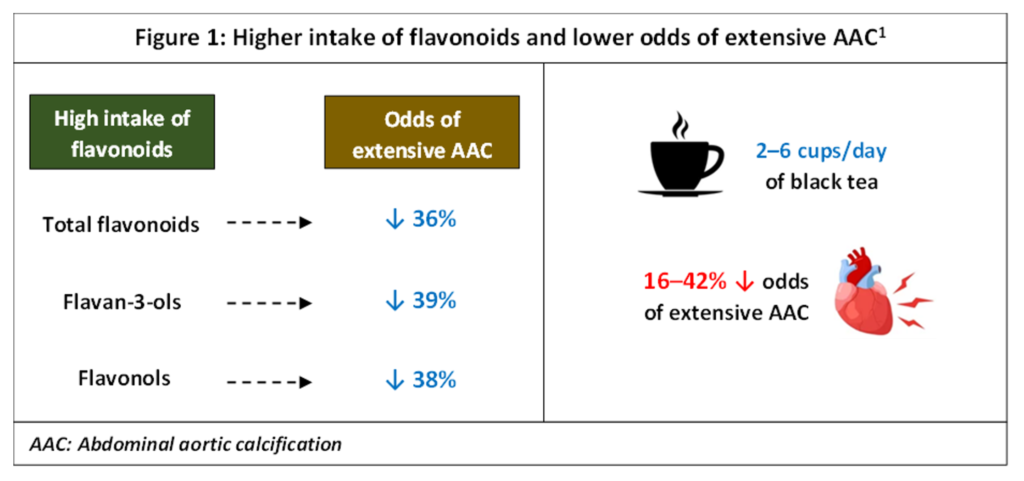
A recently published study in the journal, Arteriosclerosis, Thrombosis, and Vascular Biology, reported that elderly people who consumed black tea (main source of flavonoids) were less likely to develop abdominal aortic calcification (AAC), a significant predictor of cardiovascular diseases [1]. Calcification of abdominal aorta is associated with ageing and is linked with traditional cardiovascular risk factors. It affects normal vascular functioning and increases the risk of cardiovascular diseases and mortality [2].
Flavonoids are a group of natural substances with multiple health benefits, mediated through their antioxidant, anti-inflammatory, anti-mutagenic, and anti-carcinogenic properties. These are predominantly found in green or black tea, cocoa, onions, tomatoes, grapes, oranges, lemons, and grapes [3].
In this study, a total of 881 elderly women (78–82 years of age) were included. Daily flavonoid intake of the included participants was calculated using food-frequency questionnaires and lateral lumbar spine images were analyzed to determine the extent of calcification of the abdominal aorta [1].
The study results demonstrated that those participants who reported higher daily intake of total flavonoids had a 36% lower chance of developing extensive AAC compared to those with lower daily intake of total flavonoids. Particularly, in participants with high intake of black tea, the odds of developing extensive AAC were reduced to up to 42% (Figure 1). Among non-consumers of black tea, higher flavonoid intake from other sources was also linked with protective effects against AAC [1].

Clinical implication: Ageing increases the extent of AAC. Evidence of AAC is associated with impaired vascular functioning and arterial stiffness, resulting in cardiovascular events and mortality risk [2]. This study reported beneficial effects of high daily intake of dietary flavonoid (from black tea or other sources) on extensive AAC development, particularly in elderly women. These results suggest that as AAC is a predictor of cardiovascular events, increasing flavonoid intake in the diet may reduce future cardiovascular risk [1,2].
References
1. Parmenter BH, Bondonno CP, Murray K, et al. Higher habitual dietary flavonoid intake associates with less extensive abdominal aortic calcification in a cohort of older women. Arterioscler Thromb Vasc Biol. 2022;42(12):1482-94.
2. Bartstra JW, Mali WPTM, Spiering W, et al. Abdominal aortic calcification: From ancient friend to modern foe. Eur J Prev Cardiol. 2021;28(12):1386-91.
3. Panche AN, Diwan AD, Chandra SR. Flavonoids: An overview. J Nutr Sci. 2016;5:e47. Doi: 10.1017/jns.2016.41
